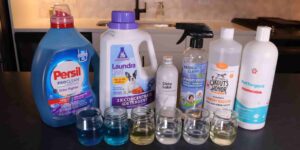Choosing the right dog food is crucial for your pet's health. Knowing which ingredients to avoid can help you make better choices.
Many dog owners want the best for their furry friends. Yet, the pet food industry can be confusing. Some ingredients may harm your dog’s health. Common fillers, artificial additives, and certain meat by-products often sneak into dog food. These can lead to allergies, digestive issues, or long-term health problems.
Understanding what to avoid empowers you to select safer options. This guide will help you identify harmful ingredients. Protect your dog’s well-being by being informed. Let’s explore the dog food ingredients you should steer clear of to ensure your pet remains happy and healthy.
Introduction To Canine Nutrition
Understanding canine nutrition is essential for every dog owner. A proper diet helps dogs stay healthy and energetic. It affects their mood, behavior, and overall well-being. Knowing what to feed your dog is just as important as knowing what to avoid.
Importance Of Healthy Diet For Dogs
A healthy diet is vital for your dog's health. It supports growth, energy, and immunity. Nutrient-rich food helps prevent diseases. Here are some key benefits of a balanced diet:
- Stronger immune system
- Healthy skin and coat
- Proper weight management
- Increased energy levels
- Better digestion
Choosing the right food affects your dog's happiness and longevity. Always prioritize quality ingredients.
Common Misconceptions About Dog Food
Many people have misunderstandings about dog food. Some believe that all dog food is the same. Others think that human food is safe for dogs. Here are some common myths:
- All meat is good for dogs. Dogs need a balanced diet, not just meat.
- Grain-free diets are always better. Some dogs need grains for fiber and nutrients.
- Dog food can be stored indefinitely. Expired food can harm your dog.
- High-protein diets are best for all dogs. Protein needs vary by age and activity level.
Understanding these misconceptions can help you choose better food. Always consult with a vet for personalized advice.

Credit: unionlakeveterinaryhospital.com
The Dark Side Of Dog Food Labels
Choosing the right dog food is hard. Many labels are confusing. Some ingredients sound healthy but may not be good for your dog. Learn about misleading labels and how to read ingredient lists. This knowledge helps you make better choices.
Misleading Marketing Tactics
Dog food companies often use clever marketing. They want to sell more products. Here are some common tactics:
- Fancy Words: Terms like “natural” or “premium” don't mean much.
- Pictures of Fresh Ingredients: These may not be in the food.
- Claims of “Vet Approved”: This can be misleading. Not all vets endorse the product.
- Highlighting One Ingredient: Focus on one good ingredient can hide bad ones.
These tactics trick pet owners. Always read beyond the label. Check what is really in the food.
The Fine Print: Understanding Ingredient Lists
Ingredient lists can be hard to read. Many people skip them. Here’s how to understand them:
- First Ingredient: This is the main ingredient. It should be high-quality protein.
- Meat Meals: Look for specific meat, not just “meat meal.”
- Avoid Fillers: Ingredients like corn and soy are low quality.
- By-products: These are leftovers, not ideal for your dog.
Here’s a simple table showing good and bad ingredients:
| Good Ingredients | Bad Ingredients |
|---|---|
| Chicken, Beef, Fish | Meat By-products |
| Sweet Potatoes | Corn |
| Brown Rice | Soy |
| Whole Grains | Artificial Preservatives |
Understanding these labels helps you choose wisely. Your dog's health depends on it.
Artificial Additives And Preservatives
Choosing the right dog food is essential for your pet's health. Many brands use artificial additives and preservatives to enhance flavor and shelf life. These substances may sound harmless, but they can pose serious risks to your dog's well-being. Understanding what to avoid is crucial.
Potential Dangers Of Synthetic Substances
Synthetic substances can lead to various health issues in dogs. Some potential dangers include:
- Allergic Reactions: Dogs may develop allergies to artificial ingredients.
- Digestive Problems: Some additives disrupt the digestive system.
- Behavioral Changes: Certain preservatives can affect mood and behavior.
- Long-term Health Risks: Continuous exposure may lead to chronic diseases.
Common Artificial Ingredients To Avoid
Be cautious of the following common artificial ingredients:
| Ingredient | Potential Risks |
|---|---|
| Propylene Glycol | Can cause skin irritation and gastrointestinal issues. |
| BHA (Butylated Hydroxyanisole) | Linked to cancer and liver damage. |
| BHT (Butylated Hydroxytoluene) | May lead to organ toxicity. |
| Artificial Colors | Can cause allergies and hyperactivity. |
| Artificial Flavors | May mask poor quality ingredients. |
Always check ingredient labels. Look for natural options instead. Your dog deserves the best nutrition.

Credit: shop.bullymax.com
Controversial Meat Sources
Choosing the right dog food is important. Some meat sources raise concerns. Understanding these controversial ingredients helps you make better choices for your pet. This section focuses on meat by-products and their risks, as well as the ethical and health implications.
Meat By-products And Their Risks
Meat by-products are parts of animals not considered whole meat. These can include:
- Organs
- Feet
- Heads
- Intestines
While some by-products are nutritious, others may pose risks:
- Quality Control: By-products can vary in quality.
- Source Uncertainty: You may not know the source of the meat.
- Health Concerns: Some by-products may carry diseases.
Look for labels that specify meat sources. Choose options that list whole meat instead of by-products.
Ethical And Health Implications
Using controversial meat sources raises ethical questions. Many people want to ensure animal welfare. Some issues include:
- Factory farming practices
- Unsanitary conditions
- Use of antibiotics or hormones
Health concerns also arise from controversial meat sources:
- Risk of contamination
- Potential allergens in by-products
Consider the overall impact on your dog's health and well-being. Prioritize transparency in ingredient sourcing.
Grains And Fillers: Necessary Or Harmful?
Dog food often includes grains and fillers. Some people believe these ingredients are essential. Others think they can harm dogs. Understanding these components helps make better choices for your pet's diet.
Identifying Low-quality Fillers
Low-quality fillers can be hard to spot. They often appear in many dog foods. These fillers provide little nutritional value. Here are some common low-quality fillers:
- Corn gluten meal
- Soybean meal
- Wheat by-products
- Rice bran
Fillers may cause allergies or digestive issues. Look for products that list real meat first. Always check the ingredient list before buying.
Grain-free Diets: Pros And Cons
Grain-free diets have become popular. They claim to be healthier for dogs. Here are some pros and cons:
| Pros | Cons |
|---|---|
| May reduce allergies | Can be more expensive |
| Improves digestion for some dogs | Not all dogs need grain-free diets |
| Encourages natural meat-based diet | May lack essential nutrients |
Consult your vet before changing your dog's diet. They can help determine what is best for your pet. Understanding grains and fillers leads to healthier food choices.

Credit: www.hibachininja.com
Chemical Preservatives To Steer Clear Of
Chemical preservatives are common in many dog foods. They help keep food fresh longer. However, some can be harmful to your dog’s health. Understanding which chemicals to avoid is essential for your pet's well-being.
Health Risks Associated With Chemical Preservatives
Certain chemical preservatives can pose serious health risks. Here are some key concerns:
- BHA (Butylated Hydroxyanisole): Linked to cancer in animals.
- BHT (Butylated Hydroxytoluene): May cause liver and kidney damage.
- Ethoxyquin: A pesticide that can cause allergic reactions.
- Propyl Gallate: Can lead to gastrointestinal problems.
Long-term exposure to these chemicals may lead to chronic health issues. Always read ingredient labels carefully.
Natural Preservation Alternatives
There are safer options for preserving dog food. Natural preservatives are healthier and safer. Here are some alternatives:
| Natural Preservative | Benefits |
|---|---|
| Vitamin E (Tocopherols) | Prevents oxidation and keeps food fresh. |
| Vitamin C (Ascorbic Acid) | Boosts immune health and acts as an antioxidant. |
| Rosemary Extract | Natural flavor enhancer and antioxidant. |
| Mixed Tocopherols | Offers a variety of vitamin E for better preservation. |
Choosing dog food with natural preservatives promotes better health. Always opt for brands that prioritize your pet's safety.
Artificial Colors And Flavor Enhancers
Many dog foods contain artificial colors and flavor enhancers. These ingredients may seem harmless, but they can harm your dog's health. Understanding their effects is crucial for making better choices for your pet.
The Impact Of Artificial Colors On Dogs
Artificial colors make dog food look appealing. They attract pet owners and make food visually exciting. However, these colors have no nutritional value.
Some common artificial colors include:
- Red 40
- Yellow 5
- Blue 2
Studies show that artificial colors can cause:
- Allergic reactions
- Hyperactivity
- Digestive issues
Choosing natural colors is a better option. Look for ingredients like:
- Beet pulp
- Carrot powder
- Spinach powder
Flavorings: Unnecessary And Potentially Harmful
Flavor enhancers are often added to dog food. They make the food tastier. However, many of these flavorings are artificial.
Some common flavor enhancers include:
- Propylene glycol
- Monosodium glutamate (MSG)
These ingredients can lead to health issues, such as:
- Kidney damage
- Liver problems
- Weight gain
Dogs don’t need artificial flavorings. Natural ingredients provide better taste and nutrition. Look for foods that use:
- Real meat
- Fruits
- Vegetables
Reading labels carefully helps you avoid harmful additives. Prioritize your dog’s health by choosing better options.
Sweeteners And Sugars: The Hidden Dangers
Many dog food brands add sweeteners and sugars to their products. These ingredients may seem harmless. They can actually be harmful to your dog's health. Understanding these hidden dangers is vital for your pet's well-being.
Why Sugar Is Bad For Dogs
Sugar can cause several health problems in dogs. Here are some key issues:
- Obesity: High sugar content leads to weight gain.
- Diabetes: Sugar increases the risk of diabetes.
- Dental Issues: Sugars can lead to tooth decay.
- Hyperactivity: Sugar may cause erratic energy levels.
These issues can significantly affect your dog's quality of life. Avoiding sugar is essential for maintaining their health.
Identifying Hidden Sugars In Ingredients
Many dog food labels hide sugars under different names. Look for these common terms:
| Ingredient Name | Description |
|---|---|
| Sucrose | Common table sugar. |
| Fructose | Fruit sugar, often found in sweet fruits. |
| Glucose | A simple sugar used for energy. |
| High Fructose Corn Syrup | A cheap sweetener made from corn. |
| Molasses | A thick syrup from sugarcane or sugar beets. |
Reading labels carefully helps spot these hidden sugars. Choose dog foods with natural ingredients instead. Avoid any product with high sugar content.
Navigating Dog Food Allergies And Sensitivities
Navigating dog food allergies and sensitivities can be challenging. Many dogs react to certain ingredients. Knowing what to avoid helps keep your dog healthy.
Common Allergens In Dog Foods
Some ingredients often cause allergies in dogs. Here are the most common allergens:
- Beef: Many dogs react poorly to beef.
- Chicken: This is another frequent allergen.
- Dairy: Lactose can upset many dogs' stomachs.
- Eggs: Some dogs cannot digest eggs well.
- Wheat: Gluten can cause skin and digestive issues.
- Soy: Often found in cheaper dog foods, soy can cause problems.
- Fish: Some dogs may have sensitivities to fish.
Each dog is different. Symptoms can vary widely. Common signs include:
- Itchy skin
- Digestive upset
- Ear infections
- Vomiting
- Diarrhea
Choosing Hypoallergenic Dog Food Options
Hypoallergenic dog food can help dogs with allergies. These foods contain fewer common allergens.
| Ingredient Type | Description |
|---|---|
| Novel Proteins | Proteins like duck or kangaroo. |
| Limited Ingredients | Fewer ingredients help identify allergens. |
| Grain-Free Options | Good for dogs sensitive to grains. |
Check labels carefully. Look for limited ingredient diets. Consult your vet for recommendations. Always introduce new foods slowly. This helps monitor any reactions.
Making Informed Choices For Your Pet
Choosing the right dog food is essential for your pet's health. Many ingredients can harm your dog. Understanding what to avoid helps you make better choices. Pay attention to the labels. Read carefully to know what your dog eats.
Tips For Reading Dog Food Labels
Reading dog food labels can be tricky. Here are some tips to help:
- Check the Ingredients List: Ingredients are listed by weight. The first five ingredients are most important.
- Avoid Fillers: Watch out for corn, soy, and wheat. They offer little nutrition.
- Look for Named Proteins: Choose foods with real meat, like chicken or beef.
- Beware of Artificial Additives: Avoid preservatives, colors, and flavors.
- Check for By-products: Meat by-products can be low-quality.
Consulting With Veterinarians On Diet
Your veterinarian is a valuable resource. They can guide you on the best diet for your dog. Here are some points to consider:
- Health Needs: Discuss any health issues your dog has.
- Age and Size: Different dogs need different diets.
- Allergies: Identify any food allergies your dog may have.
- Brand Recommendations: Ask for trusted dog food brands.
- Regular Check-ups: Keep your vet updated on your dog's diet.
Taking these steps will ensure your dog gets the best nutrition.
The Rise Of Organic And Natural Dog Foods
The trend of organic and natural dog foods is growing fast. Many pet owners want the best for their dogs. They seek food made with real ingredients. This shift shows a change in how we think about pet nutrition.
Benefits Of Organic Ingredients
Choosing organic dog food has several benefits. Here are some key points:
- Higher Quality: Organic foods often use better ingredients.
- Fewer Chemicals: These foods avoid harmful pesticides and additives.
- Better Digestion: Dogs may digest organic food more easily.
- Improved Health: Organic diets can lead to better overall health.
- Less Allergies: Natural ingredients may reduce allergic reactions.
These benefits make organic food a smart choice for many dogs.
Deciphering ‘natural' On Dog Food Packaging
The term ‘natural' sounds appealing. Yet, it can be confusing. Many brands use it without clear meaning. Here are some points to consider:
- Check the Ingredients: Look for real meat, veggies, and grains.
- Look for Certifications: Certified natural foods have strict guidelines.
- Watch for Fillers: Avoid foods with by-products or fillers.
- Read Reviews: See what other dog owners say about the brand.
Understanding these terms helps you choose better food for your dog.
Conclusion: Prioritizing Your Dog's Health
Choosing the right dog food is essential for your dog's health. Avoid harmful ingredients. Focus on quality nutrition. A healthy diet leads to a happy, active pet.
The Payoff Of Choosing Quality Dog Food
High-quality dog food offers many benefits:
- Improved energy levels
- Better digestion
- Healthier skin and coat
- Stronger immune system
- Longer lifespan
Quality ingredients matter. They provide the nutrients your dog needs. Look for foods that list real meat first. Avoid those with fillers and by-products.
| Quality Ingredients | Poor Ingredients |
|---|---|
| Whole meats | Meat by-products |
| Whole grains | Artificial fillers |
| Fruits and vegetables | Preservatives |
Continued Education On Dog Nutrition
Understanding dog nutrition is vital. Stay informed about what to feed your dog. Read articles and watch videos. Join dog nutrition forums and groups.
- Research reputable brands.
- Look for reviews from other dog owners.
- Consult with your veterinarian.
Knowledge empowers you to make better choices. Share what you learn with fellow dog owners. Together, you can help improve your pets' health.
Frequently Asked Questions
What Ingredients Should I Avoid In Dog Food?
Avoid ingredients like artificial preservatives, fillers, and by-products. These can be harmful to your dog's health. Common harmful ingredients include corn, soy, and meat meals. Always read labels carefully and choose high-quality dog food without harmful additives for your pet's well-being.
Are Grain-free Dog Foods Safe?
Grain-free dog foods can be safe but require caution. Some dogs may thrive on grain-free diets, while others may not. It's essential to consult your veterinarian before making significant dietary changes. Monitor your dog for any adverse reactions after switching to grain-free options.
How Can I Identify Harmful Dog Food Ingredients?
Check the ingredient list for artificial additives, by-products, and fillers. Look for whole foods and named meat sources as primary ingredients. Research any unfamiliar ingredients online to understand their effects on your dog's health. Knowledge is key to ensuring your dog eats nutritious food.
Why Are By-products Bad For Dog Food?
By-products can include low-quality animal parts not fit for human consumption. They may lack essential nutrients and can be difficult for dogs to digest. Choosing dog food with named meats ensures higher quality ingredients. Always prioritize whole, natural ingredients for your dog's diet.
Conclusion
Choosing the right dog food is crucial for your pet's health. Avoiding harmful ingredients helps keep your dog happy. Read labels carefully before buying. Look for high-quality proteins and wholesome grains. Stay away from fillers and artificial additives. Your dog deserves the best nutrition.
A healthy diet leads to a happy life. Make informed choices for your furry friend. Remember, a little knowledge goes a long way. Keep your dog strong and vibrant with good food. Prioritize their well-being with every meal. Your dog will thank you for it.














